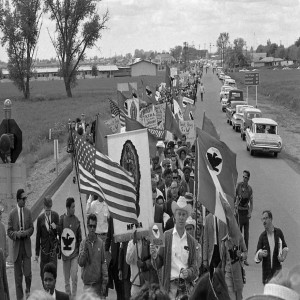
On this day in labor history, the year was 1965.
That was the day the Delano Grape Strike began in California.
The strike came a year after activists had forced Congress to end the Bracero contract labor program.
The Filipino Agricultural Workers Organizing Committee, led by Larry Itliong, Philip Vera Cruz and others called the strike against the Delano Growers and the Coachella Valley Grape Growers.
It had been a record harvest.
Farmworkers demanded higher wages, humane working conditions and union recognition.
When the growers refused, thousands walked out of the fields.
A week later, the Mexican-American National Farmworkers Association, led by Cesar Chavez and Dolores Huerta, joined the strike.
It was a historic moment.
Within a year the two unions would merge to form the United Farm Workers.
The union sent strikers to the Oakland docks to persuade Longshoremen not to load non-union grapes.
Many of the Filipino workers in the San Joaquin Valley worked in the Alaska fish canneries organized by the ILWU in the off season.
And so the ILWU honored their union brothers request.
Thousands of cases of grapes were left to rot on the docks.
This initial victory led Chavez to organize a grape boycott against heavy weights, DiGiorgio and Schenley Industries.
Six months into the strike, union leaders marched 300 miles from Delano to Sacramento to bring attention to their struggle.
They hoped to pressure growers to the negotiating table and legislators to act on their behalf.
For five years, the strike and boycott continued, with marches, organizing and picket line arrests.
Gradually, the UFW began winning higher wages, union recognition and hiring halls.
Finally in 1970, a collective bargaining agreement covering 10,000 workers was reached.
More Episodes
 2023-09-20
2023-09-20
 2023-09-19
2023-09-19
 2023-09-18
2023-09-18
 2023-09-17
2023-09-17
 2023-09-16
2023-09-16
 2023-09-15
2023-09-15
 2023-09-13
2023-09-13
 2023-09-11
2023-09-11
 2023-09-10
2023-09-10
 2023-09-09
2023-09-09
 2023-09-08
2023-09-08
 2023-09-06
2023-09-06
 2023-09-05
2023-09-05
 2023-09-04
2023-09-04
 2023-09-03
2023-09-03
 2023-09-02
2023-09-02
 2023-09-01
2023-09-01
Create your
podcast in
minutes
- Full-featured podcast site
- Unlimited storage and bandwidth
- Comprehensive podcast stats
- Distribute to Apple Podcasts, Spotify, and more
- Make money with your podcast
It is Free
- Privacy Policy
- Cookie Policy
- Terms of Use
- Consent Preferences
- Copyright © 2015-2024 Podbean.com




